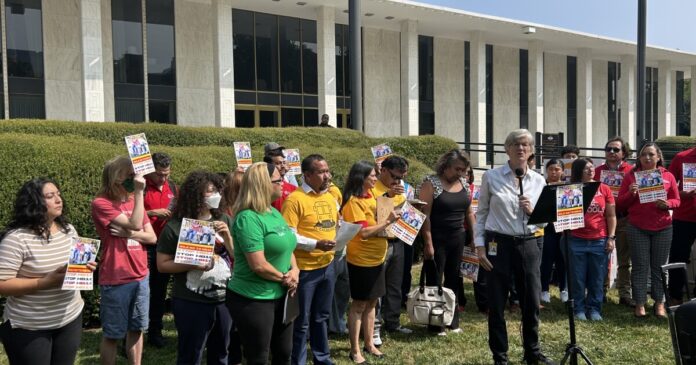North Carolina lawmakers are poised to pass nearly a quarter billion dollars in additional funding for private school vouchers.
The House will vote Wednesday on a bill that would help pay for private school tuition for about 55,000 families on a waitlist. Rachel Brady is the mother of one child who already received a voucher, known as an Opportunity Scholarship, in the first round of funding.
“But our second child, as a new applicant, did not receive the funding because basically the funding ran out,” Brady said.
It ran out because a new law allowed any family to apply regardless of their income or past enrollment in a private school. When that happened, applications flooded in.
Middle income families like the Bradys got waitlisted alongside thousands of new applicants. When this school year started, the Bradys paid more for their second son to attend the same Wake County private school than his older brother.
“We made sacrifices at home so that our children could both be in school this year,” Brady said, explaining they’ve cut back on luxuries like extra-curricular activities. “But I know that that’s not the same for every family in North Carolina. Many families have had to not put their children in the school of their choice.”
Bill reimburses students currently enrolled in private schools
Republican leaders announced months ago that they wanted to clear the waitlist before school started, but negotiations stalled between the House and the Senate.
Last Friday, a new bill emerged that would reimburse waitlisted students who have already enrolled in a private school or can get into one by October. That might be too difficult for some families who hoped to attend private school for the first time with the help of a voucher.
The Senate passed the bill Monday, and Rachel Brady was there. This was her second trip to the legislature in recent months after organizing a rally in July to call for Opportunity Scholarship funding.
“We went to be able to personally thank them for hearing our voices and for taking action,” Brady said.
The advocacy group Parents for Educational Freedom in North Carolina released a statement after the vote saying, “Parental school choice in North Carolina has much to be thankful for.”
The bill also includes $75 million for vouchers for students with disabilities, and raises funding for Opportunity Scholarships in upcoming budgets up to $825 million annually by 2032.
Democrats, advocates worry about shifting priorities away from public schools
The bill passed the Senate along party lines. Only Democratic senators commented when it went for a vote, each in opposition, including Graig Meyer, who serves Orange, Person and Caswell Counties.
“Our public schools could do so much with just the $248 million that we’re appropriating today. What could we do? We could do a 3.5% raise for teachers,” Meyer said. “We could add 575 counselors, social workers, and nurses or school psychologists. We could add 700 teachers assistants to help our youngest children learn how to read.”
House Speaker Tim Moore said the House held out on passing an earlier voucher bill to push for more funding for public schools to be attached. This new bill includes funds to account for enrollment growth at school districts and charter schools that see increases in their student population, but no new across-the-board funding for public schools.
Democrats say the voucher funding is primarily for wealthy families.
“It’s a brazen attempt to subsidize the education of the wealthy at the expense of our most vulnerable children,” said Senator Michael Garrett of Guilford County. “It’s Robin Hood, but in reverse.”
But voucher advocates say that doesn’t show the whole picture. Lower income families got first priority for scholarships, and some families on the waitlist could have household incomes as low as $57,000 for a family of four. State data also show 70% of those on the waitlist have household incomes above $115,000 for a family of four.
However, Parents for Educational Freedom in North Carolina, which receives a state contract to help families apply for vouchers, say the number of applicants in the highest income bracket may be inflated because those who didn’t provide financial information on time were placed in that category.
Public school advocates worry that state funding will directly shift from public to private schools when students switch. They also say they’re concerned about what this bill says about the state’s priorities.
Heather Koons, with the advocacy group Public Schools First NC, said funding for Opportunity Scholarships comes with a significant opportunity cost.
“If you’re talking about one pie, one budget … these legislators are taking a slice and putting it toward private school tuition, when that slice could instead be used to increase the size of the slice that’s going to public education,” said Koons, adding it’s as if the state is funding three systems of schooling now.
“We have our traditional public schools, we have charter schools that have looser regulations than our traditional public schools, and now the state is starting to fund a private school system,” she said.
If this bill becomes law, it promises more than $625 million for Opportunity Scholarship vouchers next year, and more for each of the next seven years to come.
